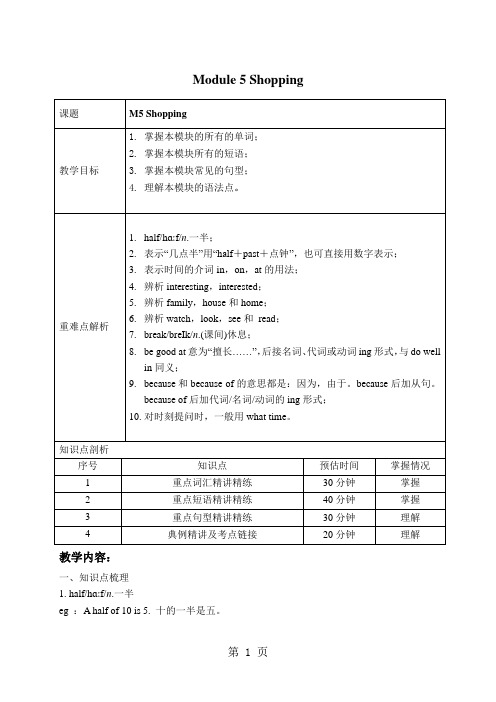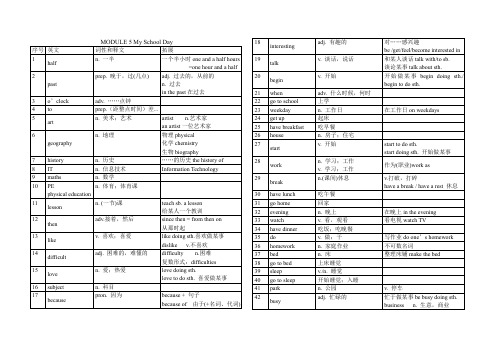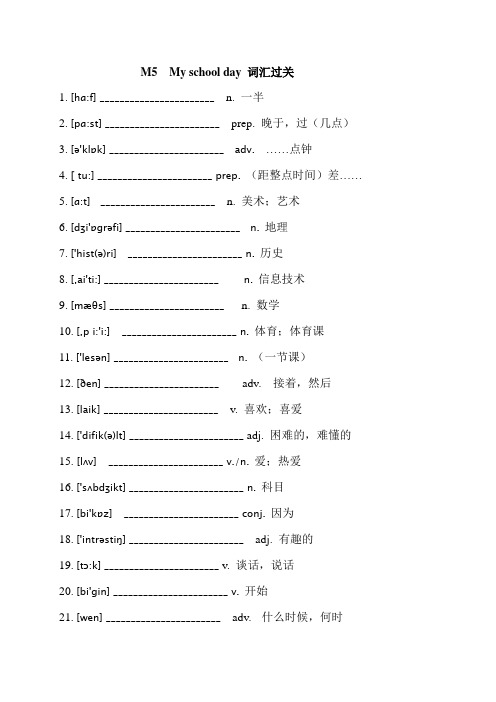七年级上册外研版英语m5知识点
外研版英语七年级上册Module 5知识点讲解-最新学习文档

Module 5 Shopping 课题M5 Shopping教学目标1. 掌握本模块的所有的单词;2. 掌握本模块所有的短语;3. 掌握本模块常见的句型;4. 理解本模块的语法点。
重难点解析1.half/hɑːf/n.一半;2.表示“几点半”用“half+past+点钟”,也可直接用数字表示;3.表示时间的介词in,on,at的用法;4.辨析interesting,interested;5.辨析family,house和home;6.辨析watch,look,see和read;7.break/breIk/n.(课间)休息;8.be good at意为“擅长……”,后接名词、代词或动词ing形式,与do wellin同义;9.because和because of的意思都是:因为,由于。
because后加从句。
because of后加代词/名词/动词的ing形式;10.对时刻提问时,一般用what time。
知识点剖析序号知识点预估时间掌握情况1 重点词汇精讲精练30分钟掌握2 重点短语精讲精练40分钟掌握3 重点句型精讲精练30分钟理解4 典例精讲及考点链接20分钟理解教学内容:一、知识点梳理1. half/hɑːf/n.一半eg :A half of 10 is 5. 十的一半是五。
【考点一】half的复数形式是把f变为v,再加-es。
eg:Two halves make a whole. 两个一半构成一个整体。
【考点二】half作形容词,意为“一半的”。
eg:Half the apples are good. 这些苹果一半是好的。
【考点三】搭配:half an hour半个小时an hour and a half=one and a half hours一个半小时典例精讲:H ________ of the students in our class are boys.2. half past six六点半【考点】表示“几点半”用“half+past+点钟”,也可直接用数字表示。
_ Module5 My School Day知识点总结 外研版七年级英语上册

Key points1、①what 引导的特殊疑问句,what are our lessons 的同义表达what lessons do we have,这两句都可以用于询问“我们上什么课”。
②lesson 作名词,意为“(一节)课”,是可数名词。
Eg :We have an English lesson every day. 表示“第几课”要用“Lesson+基数词”,其中lesson 和基数词的首字母都要大写,基数词也可以用阿拉伯数字来表示。
Eg: Lesson Five.2、①上课 用短语“have+学科名称”或“have a/an+学科名称+ lesson/class ” Eg: have Chinese=have a Chinese lessonhave English=have an English lesson②be good at sth.(do well in ) 擅长某事 be good at doing sth.擅长做某事 Eg :She is good at playing football. =She does well in playing football.3、①because 连词,引导原因状语从句,常用来回答why 引导的特殊疑问句。
Eg: —Why do you like English? —Because it ’s interesting.5、go to school “去上学”,此时school 前不必加任何冠词。
【拓展】go to the school 意为“到那所学校去(不一定是去上学)”。
Eg :They go to the school to watch a football match.【固定搭配】go home 回家 go to college 去上大学 go to sleep 入睡;开始睡觉 注意go home 是动词短语,home 是地点副词。
M5 基础知识外研版七年级英语上册

M5 My school day 词汇过关1. [hɑ:f] _______________________n. 一半2. [pɑ:st] _______________________prep. 晚于,过(几点)3. [ə'klɒk] _______________________adv. ……点钟4. [ tu:] _______________________ prep. (距整点时间)差……5. [ɑ:t]_______________________n. 美术;艺术6. [dʒi'ɒgrəfi]_______________________ n. 地理7. ['hist(ə)ri] _______________________ n. 历史8. [,ai'ti:]_______________________ n. 信息技术9. [mæθs]_______________________n. 数学10. [,p i:'i:]_______________________ n. 体育;体育课11. ['lesən] _______________________ n. (一节课)12. [ðen] _______________________adv. 接着,然后13. [laik] _______________________v. 喜欢;喜爱14. ['difik(ə)lt] _______________________ adj. 困难的,难懂的15. [lʌv]_______________________ v./n. 爱;热爱16. ['sʌbdʒikt]_______________________ n. 科目17. [bi'kɒz]_______________________ conj. 因为18. ['intrəstiŋ]_______________________adj. 有趣的19. [tɔ:k] _______________________ v. 谈话,说话20. [bi'gin] _______________________ v. 开始21. [wen] _______________________adv.什么时候,何时22. ['wi:kdei] _______________________n. 工作日23. [haʊs]_______________________ n. 房子;住宅24. [stɑ:t]_______________________ v. 开始25. [wɜ:k]_______________________ n./v. 学习;工作26. [breik] _______________________ n.(课间)休息27. ['i:v(ə)niŋ]_______________________ n. 晚上28. [wɒtʃ] _______________________v. 看,观看29. [du:] _______________________v. 做;干30. ['həʊmwɜ:k] _______________________ n.家庭作业31. [bed] _______________________ n. 床32. [sli:p] _______________________n. 睡觉v.睡觉33. [pɑ:k]_______________________ n. 公园34. ['bizi] _______________________ adj. 忙的繁忙的35.[wɒʃ] _______________________ v.洗;洗涤36. [feis] _______________________ n.脸37. ['minit] _______________________ n.分钟Revision module A38. ['ɡrændmɑ:] _______________________ n.(外)祖母39. ['ɡrændpɑ:] _______________________n.(外)祖父40. [him] _______________________ pron. (宾格)他41. [wɒnt]_______________________v. 想要;需要42. [meik]_______________________ v. 做、制作43. ['kitʃən]_______________________ n.厨房44. ['fɑ:mə] _______________________ n. 农民45. [wi:k] _______________________n. 星期46. [ri:d]_______________________ v. 阅读;看懂47. ['stɔ:ri] _______________________ n. 故事48. [liv]_______________________ v. 生活;住M5 My school day 基础知识自查I. Words1. [ə'klɒk] ___________________2. [dʒi'ɒgrəfi] ___________________3. ['hist(ə)ri] ___________________4. ['difik(ə)lt] ___________________5. ['sʌbdʒikt] ___________________6. ['intrəstiŋ]___________________7. [bi'kɒz] ___________________ 8. [bi'gin] ___________________ 9. [breik] ___________________ 10. [wɒʃ] ___________________ 11. ['minit] ___________________ 12. ['lesən] ___________________ 13. [wɒnt] ___________________ 14. [meik] ___________________ 15. ['stɔ:ri] ___________________ 16. ['kitʃən] ___________________ II. Phrases17. 上学___________________ 18. 吃午餐_________________________ 19. 回家___________________ 20. 上床睡觉__________________________ 21. 开始睡觉;入睡_____________ 22. 六点半_________________________ 23. 八点五十五___________________ 24. 一点二十分______________________III. Sentences25. 贝蒂,星期一我们上什么课?____________________________________________________________________ 26. 我们8点钟上语文课,8点55分我们上科学课。
外研版七上英语M5 知识点讲解及习题

一.时间介词in, on, at 的用法(1)at , 时刻; 在几点几分。
(2) on, 日子; 在星期几, 几月几日。
(3) in , 早,午,晚,月,季,年。
(4) on, 特指某天的,特别的早,午,晚。
①I go to school _______ weekdays , but not ___________ Saturday and Sunday .②We start lessons __________ half past eight _________ the morning .③There are four lessons _______ the morning and three lessons ______ the afternoon.④They play football ______Wednesday afternoon and have a party _____Saturday evening .二. be good at的含义及用法(1)表示擅长;(2 ) be 随主语不同,I 用am ;you 用are;is跟着he, she, it;单数is, 复数are.① You _____ good at maths , but your brother _________ good at history.②The twins ______ very good at geography, but I _______ good at English. 三.询问时间及其回答。
(1) 询问时间: ①What’s the time? ②What time is it ?回答时间: ①It’s + 具体时刻.(2) 时间的表达方法1)直接读数法,先时后分。
2)添加介词法,先分后时。
①整点,o’clock ②几点过几分, past ③几点差几分, to ④15分钟, a quarter ⑤ 30分钟, half 7:55________________ ______________ 2:25 ________________ ________________ 1:15________________ ______________ 10:30________________ ________________ 3)am, 上午, 指凌晨0:00至正午12:00的时间段;pm, 下午, 指正午12:00至子夜0:00的时间段4:30 am________________ 9:40 pm _________________四.建议的常用句式(1)What about s t h ?What about s b ? What about doing s t h ?(2)Let’s do s t h ?1.Let’s _________ (have) some fish and vegetables for dinner.()2. —__________ eating some fish for supper? —Sorry, I don’t like it.A. Let’sB. Would you likeC. What aboutD. Shall we 五.because 与so 的用法(1)because , 因为, 后接表示原因的句子.(2)so , 因此,所以,后接表示结果的句子.(3) because 与so 不能同时出现在一个句子中。
外研版七年级上册M5

注意: at noon 在正午 at night 在晚上
知识讲解
要点 3 be good at和do well in be good at 擅长 I am good at swimming. do well in 擅长 I do well in swimming. be weak in 不擅长 I am weak in swimming.
Module 5 My school days
主讲人:姜老师
目录
CONTENTS
01 词汇篇
02 语法篇
词汇篇
知识讲解
要点 1 What’s the time ? 几点了 What time it is ? 几点了 回答用 It’s +时间
知识讲解
要点 2
in , at , on后面跟时间的用法
“分钟+past+钟点” 10:25 twenty-five past ten “分钟+to+钟点” 11:50 ten to twelve (3)半点表达 “half past+基数词” 10:30 half past ten
重点语法
一般现在时
使用情境:(1)表示现在存在的状态 (2)表示以某种频率发生的事情 (3)表示客观真理或者普遍事实
知Байду номын сангаас讲解
要点 5 talk to/with 和……交谈 I like talking to/with my friends. talk about 谈论……
Can you talk about your hobby?
知识讲解
要点 6 不及物动词 开始
begin
School begins at 8 o’clock.
外研版英语七年级上册M5-M6语法复习

提示: 1】认真听课,高效复习。 2】在笔记本上标出不熟悉的语法,课后问老师或再把语 法研究一遍,务必掌握。 3】先复习,做练习,再研究错题,复习效果翻倍。
M5语法复习
1】时间表达法
o'clock
12
to
9
3
past
6
half past
M5语法复习
1】时间表达法 1. 顺读法 It' s + 点钟+ 分钟 2. 逆读法 It's + 分钟+... + 点钟 (1)小于30分钟:It's + 分钟+ past + 点钟 (2)等于30 分钟:It's + half past + 点钟 (3)大于30分钟: It's + (60-分钟)+to+ (点钟+1) (4)整点: It's + 点钟+ o'clock (5)等于15分钟:It's + a quarter past + 点钟 (6)等于45分钟: It's + a quarter to + (点钟+1)
M5一般现在时复习
1】定义 表示经常或反复发生的动作
2】用法: 1. 表示经常发生的动作(V原 或者V三单) 2. 表示现在的状态(Be) 3. 表示客观事实或普遍真理。
3】V形 Be ( is /am /are ); V原 ; V三单(当主语是第三人称 单数)
M5一般现在时复习
4】句型 1.肯定句: 主语+ be + 其他 主语+ V原 + 其他; 主语+ V三单+其他 2.否定句:主语+be +not +其他 主语+ don’t + V原+ 其他 主语 + doesn’t + V原 + 其他 3.疑问句: Be + 主语 + 其他? Do + 主语 + V原 +其他? Does + 主语 + V原 +其他? (注意: 在主+谓+宾结构中,否定句和疑问句要借助 助动词do 或does)
七年级上册英语知识点外研版m5
七年级上册英语知识点外研版m5七年级上册英语知识点外研版m5重点内容包括:一、语法1. 一般现在时一般现在时用来表示经常性、习惯性的动作或状态。
结构:主语+谓语动词(原形)+其他例如:He often gets up early.(他经常早起)2. 现在进行时现在进行时用来表示现在正在发生的动作。
结构:主语+be动词(am/is/are)+现在分词+其他例如:She is reading a book now.(她正在读一本书)3. 一般过去时一般过去时用来表示已经发生的动作。
结构:主语+谓语动词(过去式)+其他例如:They went to the park yesterday.(他们昨天去了公园)4. 现在完成时现在完成时用来表示过去已经完成的动作对现在造成的影响或状态。
结构:主语+have/has+过去分词+其他例如:I have finished my homework.(我已经完成了我的作业)二、词汇1. 表示事情的词汇例如:amazing(令人惊奇的)、dangerous(危险的)、exciting(令人兴奋的)、noisy(嘈杂的)、peaceful(和平的)、quiet(安静的)、terrible(可怕的)、wonderful(精彩的)2. 表示衣服的词汇例如:coat(外套)、dress(连衣裙)、jeans(牛仔裤)、shirt(衬衫)、shoes(鞋子)、skirt(裙子)、socks(袜子)、sweater(毛衣)、T-shirt(T恤衫)3. 表示家庭成员的词汇例如:aunt(姑妈/舅妈)、brother(兄弟)、cousin(表兄弟/表姐妹)、father(父亲)、grandfather(祖父)、grandmother (祖母)、mother(母亲)、sister(姐妹)、uncle(叔叔/舅舅)三、阅读理解阅读理解是英语学习的重要环节之一,通过阅读可以提高语感和阅读能力。
季外研版七年级上册Module5知识点
like to do sth.
表示一次性的,未发生的动作。
like doing sth.
表示习惯性的动作或爱好。
在现代英语中 He likes to play football this afternoon.
like to do sth.和
like doing sth.区
I like singing.我喜欢唱歌。
教学内容
教学 重、难点
优选精品
欢迎下载
初一上 M5 知识点
目标一 Module 5 知识点梳理
目标二 Module 5 语法点解析
目标三 综合练习
Part 1 重点短语
1. 上语文课 ______________________
9. 看电视 _____________________
2. 我最喜欢的科目 _________________
练一练:根据时间,用顺读与逆读法写出时间
7:40 顺读:seven forty
逆读:twenty to eight
1:15 顺读: one fifteen 逆读: a quarter past one
08:15
10:30
02:45
08:30 half past eight
2.【辨析】like to do sth.和 like doing sth
欢迎下载
表示“月、季节、年、世纪”或泛指“上午、下午、晚上”。
in eg:in May 在五月,in the evening 在晚上
表示“在具体的某一天”或“(在具体的某一天的)早上、下午、晚上”等,“在星期几”或“在
on
星期几的早上、下午、晚上”等,“在某一节日”。
eg: on Sunday morning 在周日上午,on Teachers' Day 在教师节那天
外研版七年级英语上册Module 5 知识汇总
Module5知识梳理【重点短语】1.my school day 我的学校生活2.on Tuesday 在星期二3.have Chinese=have a Chinese lesson 上语文课4.at five to nine =at eight fifty-five 在八点五十五5.at half past seven =at seven thirty 在七点半6.on Wednesday afternoon 在星期三下午7.be good at...=do well in... 擅长于......, 在......做得好8.talk with/to sb 和......谈话9.on weekdays=on the weekday 在工作日10.go to school 上学11.go home 回家12.have a healthy breakfast 吃健康早餐13.go swimming 去游泳14.play football 踢足球15.play with sb 和......玩耍16.make apple juice 制作苹果汁17.in the kitchen . 在厨房里18.do sports 进行体育锻炼19.want to do sth 想做......20.on weekends=on the weekend 在周末21.get up 起床22.have breakfast 吃早饭23.be next to.... 紧挨着..24.start work=start lessons 开始工作/学习25.have a break (for twenty minutes) 休息(20分钟)26.go to the playground 到操场27.watch TV 看电视28.have dinner with sb 和...... 吃晚饭29.do one’s homework 做某人的家庭作业30.do one’s maths homework 做某人的数学家庭作业31.go to bed 上床睡觉32.go to sleep 入睡33.wash one’s face 洗脸34.make sb/sth +形容词使某人/物怎么样make him happy 使他开心make the room clean 使房间干净35.have a busy day 度过繁忙的一天36.after school 放学后(表时间的短语)37.finish school 放学(实义动词短语)【重点句子】1. What’s the time?=What time is it? 几点了?It’stwenty past one.=It’s one twenty. 一点二十。
外研版七年级上册知识点整理M1M5
外研版七年级上册知识点整理M1-M5Module 1重点短语1.be from... =come from... 来自......2....years old ......岁3.what about... =how about... ......怎么样?4.in Class Ten, Grade Seven 在七年级十班5.the capital of... ...... 的首都/省会6.first name =given name 名st name=family name 姓8.English name 英文名字9.Chinese name 中文名字重点句子1.I’m Chinese ,and I’m from China.(I’m Chinese, and I come from China.)我是中国人, 我来自中国2. Where are they from? (=Where do they come from?) 他们来自什么哪里?They are from America. (=They come from America.) 他们来自美国.3.How old is that man? 那位男子多少岁了? He is forty-four.他44岁4. The students are in Class Five, Grade Seven. 这些学生在七年级五班5. Tom is in Class One with Lingling. 汤姆和玲玲在一班。
=Tom with Lingling is in Class One. =Tom and Lingling are in Class One.6.What about you?=How about you?=And you? 你呢?/你怎么样?7.Welcome to Class 6 Grade 7 ! 欢迎到七年级六班。
8. Beijing is the capital of China. 北京是中国的首都。
- 1、下载文档前请自行甄别文档内容的完整性,平台不提供额外的编辑、内容补充、找答案等附加服务。
- 2、"仅部分预览"的文档,不可在线预览部分如存在完整性等问题,可反馈申请退款(可完整预览的文档不适用该条件!)。
- 3、如文档侵犯您的权益,请联系客服反馈,我们会尽快为您处理(人工客服工作时间:9:00-18:30)。
七年级上册外研版英语m5知识点Unit 5 of the seventh grade textbook is an important one, as it covers many essential grammar and vocabulary points that are critical to becoming proficient in English. In this article, we will take a look at some of the key concepts discussed in the chapter, along with examples and practice exercises to help you master the material.
1. Verbs + -ing form
One important grammar point covered in the unit is the use of verbs followed by the -ing form. This form is used to indicate actions that are happening at the same time as another action, or actions that cause other actions to occur. For example:
- She stopped playing basketball to take a break. (stopped + verb + -ing to indicate a break from playing basketball)
- I enjoy watching movies on Friday evenings. (enjoy + verb + -ing to show pleasure in watching movies)
Practice exercise:
Rewrite the following sentences using verbs and -ing forms:
- He stopped driving the car to answer his phone.
- They enjoy playing video games together.
2. The Present Continuous tense
Another important concept in unit 5 is the present continuous tense, which is used to talk about actions that are happening at the moment of speaking. For example:
- They are studying for a test right now. (present tense of 'to be' + verb + -ing to indicate an action happening at the moment of speaking)
Practice exercise:
Complete the following sentences with the present continuous tense:
- I _____________ (cook) dinner for my family right now.
- She _____________ (watch) a movie in the living room at the moment.
3. Nouns + -ing form
In addition to using verbs with -ing forms, unit 5 also covers the use of nouns followed by -ing forms. This form is used to indicate a person, place, or thing that is responsible for an action. For example:
- The chef cooking the meal is very experienced. (noun + verb + -ing to indicate the person responsible for cooking the meal)
- The library reading room is a quiet place to study. (noun + verb + -ing to indicate the place where one can read)
Practice exercise:
Rewrite the following sentences using nouns and -ing forms:
- The man walking down the street is my brother.
- The place to have fun is the amusement park.
4. Modal verbs
Finally, unit 5 covers modal verbs, which are used to indicate the likelihood or necessity of an action. Some common modal verbs
include can, could, may, might, must, shall, should, will, and would. For example:
- You should study for your test if you want to do well. (should + verb to indicate advice or recommendation)
- They might go to the movies later if they finish their homework. (might + verb to indicate possibility)
Practice exercise:
Choose the correct modal verb to complete the following sentences:
- You ____________ (should/could) come to my party tonight if you want to.
- They ____________ (might/must) finish their project by tomorrow or they will fail the class.
In conclusion, unit 5 of the seventh grade textbook covers many important grammar and vocabulary concepts that are essential for becoming proficient in English. By mastering these concepts through practice exercises and additional study, you will be well on your way to achieving fluency in the language.。
